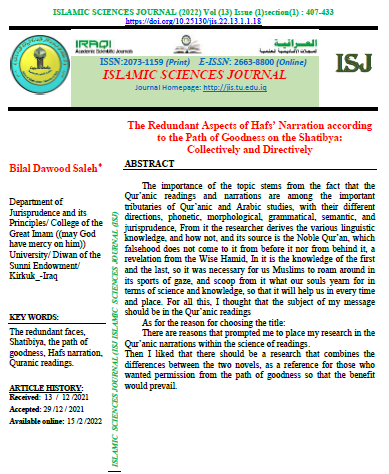The Redundant Aspects of Hafs’ Narration according to the Path of Goodness on the Shatibya: Collectively and Directively
Main Article Content
Abstract
The importance of the topic stems from the fact that the Qur’anic readings and narrations are among the important tributaries of Qur’anic and Arabic studies, with their different directions, phonetic, morphological, grammatical, semantic, and jurisprudence, From it the researcher derives the various linguistic knowledge, and how not, and its source is the Noble Qur’an, which falsehood does not come to it from before it nor from behind it, a revelation from the Wise Hamid, In it is the knowledge of the first and the last, so it was necessary for us Muslims to roam around in its sports of gaze, and scoop from it what our souls yearn for in terms of science and knowledge, so that it will help us in every time and place. For all this, I thought that the subject of my message should be in the Qur’anic readings
As for the reason for choosing the title:
There are reasons that prompted me to place my research in the Qur’anic narrations within the science of readings.
Then I liked that there should be a research that combines the differences between the two novels, as a reference for those who wanted permission from the path of goodness so that the benefit would prevail.
Article Details

This work is licensed under a Creative Commons Attribution 4.0 International License.
COLLEGE OF ISLAMIC SCIENCES, TIKRIT UNIVERSITY. THIS IS AN OPEN ACCESS ARTICLE UNDER THE CC BY LICENSE http://creativecommons.org/licenses/by/4.0/

